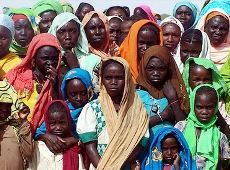Upsurge in Darfur violence restricts humanitarian access
October 9, 2007 (NAIROBI) — The upsurge in violence in the western Sudanese region of Darfur is further restricting the ability of the few humanitarian workers left to reach thousands of vulnerable civilians, aid workers warned.
 “It is difficult to access faraway villages when security is not there,” said Cecilia Goin, ICRC spokeswoman in Khartoum. “Darfur is the size of France; it is easier to reach those in need when it is stable.”
“It is difficult to access faraway villages when security is not there,” said Cecilia Goin, ICRC spokeswoman in Khartoum. “Darfur is the size of France; it is easier to reach those in need when it is stable.”
Orla Clinton, spokeswoman for the UN Office for the Coordination of Humanitarian Affairs (OCHA), said there had been a shrinking of the humanitarian space in Darfur, with hijackings having increased by more than 100 percent in August and September. As a result, aid workers were unable to access many of the vulnerable populations in internally displaced persons (IDP) camps.
Goin said fresh attacks, such as on Muhajiriya, South Darfur, this week sent thousands of civilians fleeing their homes, and made it less safe for humanitarian workers. Some 45,000 IDPs were being assisted in the town, but OCHA said it was not possible to confirm new displacement figures.
According to the Sudan Liberation Army (SLA), the attack on Muhajiriya left at least 40 people dead. The town is controlled by the SLA faction of Minni Minnawi, who signed a May 2006 peace deal and joined the Khartoum government.
“The fighting was between Arab communities, supported by the government, and Minnawi’s militia,” said an aid worker in Nyala, 80km to the west. “There are reports of a large number of casualties, but we have no confirmation.”
A separate attack on 29 September in the South Darfur town of Haskanita that left 10 African Union soldiers dead and the town destroyed, sent an estimated 7,000 civilians fleeing from their homes.
“The displaced civilians scattered into the surrounding villages after their town was occupied by Sudanese forces,” said another aid worker in the region. “It is difficult to know exactly who destroyed their houses; access is very difficult. And there is plenty of water in the area which limits movement.”
A UN assessment team found that the market had been looted. “Few civilians had returned in search of food and water,” it said in a statement. Sudanese officials, however, told local media in Khartoum that the market caught fire, and said the UN assessment team had exaggerated the extent of destruction of the town.
A source at the AU said it would take some time to determine what exactly had happened in Haskanita. The attackers destroyed buildings and armoured personnel carriers. They also stole equipment, including arms. The deaths brought to 28 the number of AU peacekeepers killed since the mission was deployed in 2004.
HYBRID FORCE
The incident, a top UN Official said, underscored the need to ensure the proposed UN-AU mission (UNAMID) would deploy troops that would be “very mobile with a capacity to dominate any situation”. But the mission still lacks ground transport, light tactical helicopters and transport helicopters, said the UN Under-Secretary-General for Peacekeeping Affairs, Jean-Marie Guéhenno.
“These capacities are vital,” Guéhenno told reporters in New York. “If we don’t have the force enablers, I am concerned that the mission will be unable to deliver on the key aspects of its work.”
The mission, however, was on track to reach its benchmarks for the deployment of initial essential personnel before January, UN Assistant Secretary-General Jane Holl Lute said. A technical team was in Khartoum to finalise the deployment plan.
Nigeria, which lost seven men in Haskanita, said it was sending more soldiers to Sudan. Army spokesman Colonel Giwa-Amu issued a statement: “The Nigerian Army has continued with its peacekeeping mission in Darfur with another batch of 680 soldiers commencing their departure from Nigeria to the crisis-ridden region of Southern Sudan for the United Nations-African Union (UN-AU) peacekeeping operations.”
The recent attacks were widely condemned, with the US calling for an immediate end to the cycle of violence in Darfur, and adherence to a ceasefire before the Libya talks. “The people of Darfur have suffered enough,” according to the US embassy in Khartoum. “Darfur needs to be built up, not destroyed.”
LIBYA TALKS
The SLA said the attacks could damage prospects for peace talks due in Libya on 27 October, but UN and AU officials remained upbeat. Jan Eliasson, the UN Secretary-General’s Special Envoy for Darfur, was in Sudan to urge all parties to the political process to seriously prepare themselves for the negotiations.
“More than ever before, the incident in Haskanita calls for political dialogue,” said George Ola-Davies, spokesman for the UN-AU Joint Mediation Support Team. “The special envoys are urging all parties to the dialogue to try and be present in Sirte, Libya, from 27 October. The doors are not closed to anybody.”
(IRIN)
